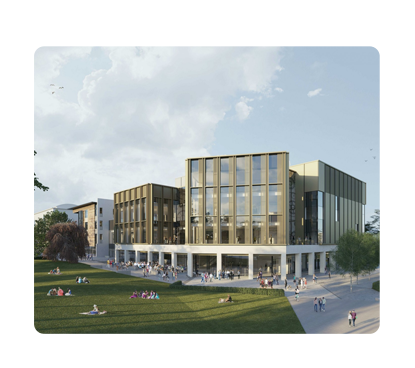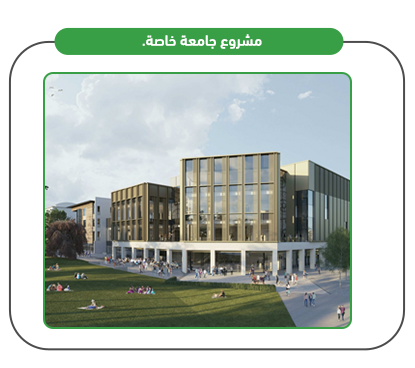Establishing a private university project is a pivotal strategic investment in the higher education sector, aiming to meet the evolving needs of the labor market and student aspirations by offering diverse and distinguished academic programs. The university features a modern, integrated educational environment, featuring advanced facilities such as advanced scientific laboratories, digital libraries, and classrooms equipped with the latest technological and educational tools. The university offers a wide range of academic majors, including engineering, business administration, science, arts, literature, and more, allowing students the freedom to choose fields that align with their interests and career aspirations. It is committed to providing high-quality education through distinguished academic staff and a select group of experts in various fields. In addition, the university seeks to enhance the student experience by providing academic support services and career guidance specifically designed to ensure their success and professional development.

The private university project aims to establish a distinguished educational institution focused on innovation and scientific research as a foundation for developing education and achieving academic excellence. The university seeks to attract talented students from around the world by offering scholarships and academic collaboration opportunities with leading international universities, enriching the educational experience and giving students the opportunity to experience diverse cultures and experiences. The university places a particular emphasis on applied education by forming partnerships with industrial and commercial institutions to offer practical training programs that link academic study with practical application, enhancing students’ readiness for the job market. It is noteworthy that the university includes advanced research centers. Like this: Innovation centers and technology incubators aim to support research and develop innovative solutions to societal and technological challenges. As part of supporting entrepreneurship, the university offers specialized programs to develop students’ leadership skills and help them establish their own businesses. This project aims to build an integrated university that enhances the quality of education and prepares generations capable of making a positive and sustainable impact on society.



Flexible and innovative curricula.
A learning environment tailored to meet individual needs.
Supporting research and innovation and promoting cultural and cognitive diversity.
Distinguished academic guidance to help students choose the right career paths.
Attracting international students.
Integrating modern educational technologies, such as virtual reality, into the educational process.
Achieving sustainable financial returns by offering tailored educational programs and organizing training courses for individuals and institutions.
Executive summary
Study project services/products
Market Size Analysis
Risk Assessment
Technical study
Financial study
Organizational and administrative study

The Education Sector in the GCC Countries
Believing in the importance of the education sector and its role in promoting the localization of the national workforce, Mashroo3k for Economic Consultancy and Market Research is pleased to present the following key indicators of the education sector in the Gulf Cooperation Council (GCC) countries, inviting investment in this vital field:
The total number of students in Early Childhood Development (including nurseries and kindergartens) across the GCC reached approximately 851,500 students, according to the latest available statistics.
The number of students enrolled in school education stages across the GCC is estimated at around 9.3 million students (79.4% in the public sector and 20.6% in the private sector).
The number of learners in adult education centers is estimated at 181,247 students.
The number of students enrolled in higher education institutions stands at 2,206,446 students.
The number of early childhood teachers is approximately 50,647.
The number of school education teachers is estimated at around 727,904.
There are 5,806 operational early childhood education institutions.
There are 32,310 operational school education institutions.
Over the past years, GCC governments have actively sought to bridge the gap between education and the labor market by adopting educational curricula that emphasize vocational and technical education and encourage learning through modern technologies and digital platforms. It is also worth noting the increasing investment in education quality across the six countries to produce graduates who meet the private sector’s workforce requirements.
According to the latest statistics:
Saudi Arabia allocates 18.9% of its budget to education.
The UAE allocates 14.8% of its budget to education.
Oman allocates 12.2% of its budget to education.
Bahrain allocates 9.8% of its budget to education.
Kuwait allocates 12.3% of its budget to education.
Qatar allocates 10.5% of its budget to education.
By 2023, the value of the private education market in the GCC is expected to reach USD 26.2 billion.
The Global Education Sector
The global education services market was valued at approximately USD 2,882.52 billion by the end of 2021. Experts project that the market will reach USD 3,191.79 billion by the end of 2022, achieving a compound annual growth rate (CAGR) of 10.7%. Furthermore, by 2026, the market value is expected to rise to USD 4,623.90 billion, reflecting a CAGR of 9.7% over the forecast period.

Investment in the Saudi private education sector grew by 3% in 2016, rising to 15.5% compared to 12.5% in 2015. Investment in the private education sector has increased over the past five years, reaching approximately 10 billion riyals.